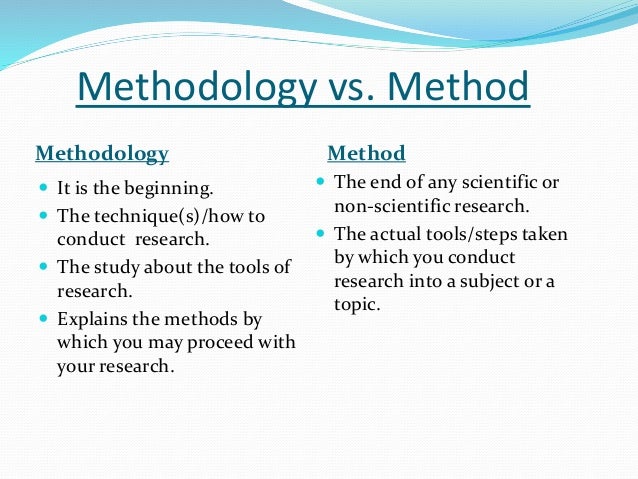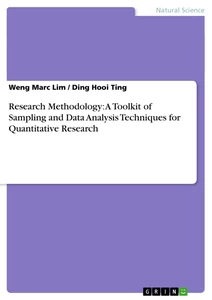According to Goddard and Melville (2001, p.1), research goes beyond the process of gathering information; rather, it is also about finding answers to unanswered questions as part of discovering and/or creating new knowledge. And in order for this newly discovered or created knowledge to be recognized or noticed, you have to prove that it is valid.
- Research Methodology And Techniques
- Research Methodology Tools And Techniques
- Research Methodology Techniques And Trends
- Research Methodology And Techniques In Geology Pdf
- Research Methodology
Research methods is a broad term. While methods of data collection and data analysis represent the core of research methods, you have to address a range of additional elements within the scope of your research. The most important elements of research methodology expected to be covered in. Research methods are specific procedures for collecting and analyzing data. Developing your research methods is an integral part of your research design. When planning your methods, there are two key decisions you will make. First, decide how you will collect data.
Determining the validity of your study is anchored on your research paper’s methodology. According to Somekh and Lewin (2005), a research methodology is both “the collection of methods or rules” you apply to your research, as well as the “principles, theories, and values” that support your research approach. Simply put, a research paper’s methodology section must shed light on how you were able to collect or generate your research data and demonstrate how you analyze them (SHU Library, 2020).
For novice researchers, writing the methodology of a research paper can be an overwhelming process, especially considering the intricate elements covered by this section (J. Ellis & Levy, 2009, p. 323). The goal of this article is to guide novice researchers in writing an effective research methodology by helping them gain a clear understanding of a research methodology’s structure.
How to Write Research Methodology Table of Contents
What Is a Research Methodology?
Methodology in research is defined as the systematic method to resolve a research problem through data gathering using various techniques, providing an interpretation of data gathered and drawing conclusions about the research data. Essentially, a research methodology is the blueprint of a research or study (Murthy & Bhojanna, 2009, p. 32).
Methodology vs. Methods
The confusion between “methodology” and “methods” in research is a common occurrence, especially with the terms sometimes being used interchangeably. Methods and methodology in the context of research refer to two related but different things: method is the technique used in gathering evidence; methodology, on the other hand, “is the underlying theory and analysis of how a research does or should proceed” (Kirsch & Sullivan, 1992, p. 2). Similarly, Birks and Mills (2011, p. 4) define methodology as “a set of principles and ideas that inform the design of a research study.” Meanwhile, methods are “practical procedures used to generate and analyze data (Birks and Mills, 2011, p. 4).
To summarize these definitions, methods cover the technical procedures or steps taken to do the research, and methodology provides the underlying reasons why certain methods are used in the process.
Methodological Approach or Methods Used in Research
Traditionally, academic researchers often approach research studies through two distinct paradigms, namely positivistic and phenomenological (Collis & Hussey, 2013). Also sometimes called qualitative and quantitative (Dumay, 2008), positivistic and phenomenological approaches play a significant role in determining your data gathering process, especially the methods you are going to use in your research.
Research methods lay down the foundation of your research. According to Neil McInroy, the chief executive of Centre for Local Economic Strategies, not using the appropriate research methods and design creates “a shaky foundation to any review, evaluation, or future strategy (Macdonald et al., 2008, p. 3). In any type of research, the data you will gather can come either in the form of numbers or descriptions, which means you will either be required to count or converse with people (Macdonald et al., 2008, p. 9). In research, there are two fundamental methods used for either approach—quantitative and qualitative research methods.
Quantitative
This approach is often used by researchers who follow the scientific paradigm (Haq, 2014, p. 1). This method seeks to quantify data and generalize results from a sample of a target population (Macdonald et al., 2008, p. 9). It follows a structured data collection process with data output in the form of numbers. Quantitative research also observes objective analysis using statistical means (Macdonald et al., 2008, p. 9).
Based on a report, quantitative research took the biggest portion of the global market research spend in 2018 (ESOMAR, 2019, page 27).
Source: Global Market Research 2019
Qualitative
Unlike the quantitative approach that aims to count things in order to explain what is observed, the qualitative research method is geared toward creating a complete and detailed description of your observation as a researcher (Macdonald et al., 2008, p. 9). Rather than providing predictions and/or causal explanations, the qualitative method offers contextualization and interpretation of the data gathered. This research method is subjective and requires a smaller number of carefully chosen respondents.

Research Methodology And Techniques
Top 5 share of qualitative methods used in the market research industry worldwide
(Q3 and Q4 of 2018)
In person focus groups
%In person in-depth interviews (IDIs)
%Telephone IDIs
%Discussions using online communities
%
Mobile
%Source: Greenbook Research Industry Trends Report Q3-Q4 2018
Designed byMixed methods
A contemporary method sprung from the combination of traditional quantitative and qualitative approaches. According to Brannen and Moss (2012), the existence of the mixed methods approach stemmed from its potential to help researchers view social relations and their intricacies clearer by fusing together the quantitative and qualitative methods of research while recognizing the limitations of both at the same time.
Mixed methods are also known for the concept of triangulation in social research. According to Haq (2014, p. 11), triangulation provides researchers with the opportunity to present multiple findings about a single phenomenon by deploying various elements of quantitative and qualitative approaches in one research.
Writing Your Research Paper Methodology
Saunders et al. (2007) proposed the concept of the research onion model to help researchers develop a methodology and construct a research design within the field of future studies. This research onion model has six main layers, which serve as a step-by-step guide for researchers to create and organize their research methodology.

The methodology section of your research paper is not all about describing your data gathering process and your analysis. Methodology is about the overall approaches and perspectives of the research process. Here are some tips as well as the problems to avoid in order to write an effective research methodology.
How to write an effective methodology section?
- Introduce your methods. Introduce the methodological approach used in investigating your research problem. In one of the previous sections, your methodological approach can either be quantitative, qualitative, or mixed methods.
- Establish methodological connection. Explain the relevance of your methodological approach to the overall research design. Keep in mind that the connection between your methods and your research problem should be clear. This means that your methodology must be appropriate to achieve your research paper’s objective—to address the research problem you presented.
- Introduce your instruments. Indicate the instruments you are going to use in collecting your data and explain how you are going to use them. These tools and instruments can be your surveys, questionnaires for interviews, observation, etc. If your methods include archival research or analyzing existing data, provide background information for documents, including who the original researcher is, as well as how the data were originally created and gathered.
- Discuss your analysis. Explain how you are going to analyze the results of your data gathering process. Depending on the methods you use, you can use statistical analysis or explore theoretical perspectives to support your explanation of observed behaviors.
- Provide background information. When using methods that your readers may be unfamiliar with, make sure to provide background information about these methods.
- Discuss sampling process. Explain the reason behind your sampling procedure. For example, if you are using statistics in your research, indicate why you chose this method as well as your sampling procedure. If you are going to do interviews, describe how are you going to choose the participants and how the interviews will be conducted.
- Address research limitations. Make sure to address possible limitations you may encounter in your research, such as practical limitations that may affect your data gathering process. If there are potential issues you anticipate to encounter in the process, indicate your reason why you still decide to use the methodology despite the risk (SHU Library, n.d.).
What to avoid in writing the methodology section of your research?
- Avoid including irrelevant details.
- Keep your methodology section straightforward and thorough. Details that do not contribute to the readers’ understanding of your chosen methods should not be included in your methodology section.
- Irrelevant information includes unnecessary explanations of basic procedures. Basic procedures should only be explained if they are unconventional and unfamiliar to the readers.
- Do not ignore the problems you might encounter during the data gathering process. Instead of turning a blind eye, describe how you handled them (SHU Library, n.d.).

Ethical Considerations
Researchers must adhere to ethical norms to ensure trust, accountability, mutual respect, and fairness (Resnik, 2015). According to Saunders, Lewis, and Thornhill (2003, p. 131), there are some ethical considerations that researchers must be mindful of, especially during the process of gathering and presenting research data:
- The rights to privacy of the individuals involved.
- The nature of participation in the research must be voluntary and the individuals involved must have the right to withdraw partially or completely from the process.
- All participants must provide their consent first.
- Maintenance of the confidentiality of data provided by individuals as well as identifiable participants’ anonymity.
- How participants react to the researchers’ methods in seeking to collect data.
- How the participants will be affected by the way in which data is analyzed and reported.
- The behavior and objectivity of the researcher.
Research Methodology Tools And Techniques
Choosing a Research Methodology
It’s now clear that the methodology section is where a researcher indicates and elaborates on the plans that must be put into motion in order to achieve the objective of the research. Being acquainted with research methodologies, however, does not make choosing the appropriate methodology easier. Walker (2006) states that selecting which research methodology is a difficult step in the research process. It can be confusing and overwhelming, especially for novice researchers.
Research Methodology Techniques And Trends
According to Holden and Lynch (2004), research should not only be “methodologically led” but the choice of which methodology to use should be consequential not only to the social science phenomenon to be investigated but also to the philosophical stance of the researcher. Similarly, Goulding (2002) claims that the choice of methodology should be based on the researcher’s interests, beliefs, and convictions. Meanwhile, other significant factors such as epistemological concerns must also be taken into consideration when choosing a research methodology (Buchanan & Bryman, 2007). On top of philosophical underpinnings and personal convictions, there are also practical considerations that can affect a researcher’s decision on what methodology to use, including the amount of existing data or knowledge, available time, and other resources (Ahmed et al., 2016, p. 32).
Research Methodology And Techniques In Geology Pdf
References
Research Methodology
- Ahmed, V., Opoku, A., & Aziz, Z. (2016). Research Methodology in the Built Environment: A Selection of Case Studies (pp. 32-49). Abingdon-on-Thames, England: Routledge. ResearchGate.
- Brannen, J., & Moss, G. (2012). Critical issues in designing mixed methods policy research. American Behavioral Scientist, 56 (6), 789-801. https://doi.org/10.1177/0002764211433796
- Buchanan, D., & Bryman, A. (2007, July). Contextualizing methods choice in organizational research. Organizational Research Methods, 10 (3), 483-501. https://doi.org/10.1177/1094428106295046
- Choy, L. T. (2014). The strengths and weaknesses of research methodology: Comparison and complimentary between qualitative and quantitative approaches. IOSR Journal of Humanities and Social Science, 19 (4), 99-104. https://doi.org/10.9790/0837-194399104
- Collis, J., & Hussey, R. (2013). Business Research: A Practical Guide for Undergraduate and Postgraduate Students (4th ed.). London: Macmillan International Higher Education. ResearchGate
- Dumay, J. C. (2008). 2 Research Methods and Research Sites Employed. Sydney, Australia: SeS Library, USYD.
- ESOMAR (2019). Global Market Research 2019. Amsterdam, The Netherlands: Esomar.
- Goddard, W., & Melville, S. (2001). Research Methodology: An Introduction (2nd ed.). Johannesburg, 2196, South Africa: Juta and Company. Google Books
- Goulding, C. (2002). Grounded Theory: A Practical Guide for Management, Business and Market Researchers. Thousand Oaks, CA: Sage.
- Haq, M. (2014). A comparative analysis of qualitative and quantitative research methods and a justification for adopting mixed methods in social research. Bradford Scholars. https://hdl.handle.net/10454/7389
- Harrison, H., Birks, M., Franklin, R., & Mills, J. (2017, January). Case study research: Foundations and methodological orientations. Forum Qualitative Sozialforschung / Forum: Qualitative Social Research, 18 (1). FQS
- Holden, M. T., & Lynch, P. (2004). Choosing the appropriate methodology: Understanding research philosophy. The Marketing Review, 4 (4), 2-18. https://doi.org/10.1362/1469347042772428
- J. Ellis, T., & Levy, Y. (2009). Towards a guide for novice researchers on research methodology: Review and proposed methods. Issues in Informing Science and Information Technology, 6, 323-337. https://doi.org/10.28945/1062
- Kirsch, G., & Sullivan, P. A. (1992). Methods and Methodology in Composition Research. Carbondale, IL: SIU Press. Google Books
- Kothari, C. R. (2004). Research Methodology: Methods and Techniques. New Delhi, India: New Age International. Google Books
- Macdonald, S., & Headlam, N. (2008). Research Methods Handbook: Introductory Guide to Research Methods for Social Research. Manchester, London: CLES.
- Mills, J., & Birks, M. (2014). Qualitative Methodology: A Practical Guide. Thousand Oaks, CA: Sage. ResearchOnline
- Murthy, S. N., & Bhojanna, U. (2009). Business Research Methods (2nd ed.). New Delhi, India: Excel Books India. Google Books
- Neville, C. (2007, July). Effective Learning Service: Introduction to Research and Research Methods. Amman, Jordan: United Nations Relief and Works Agency for Palestine Refugees. UNRWA
- Resnik, D. B. (2015, December 1). What is ethics in research & why is it important? NIEHS Research. Durham, NC: National Institute of Environmental Health Sciences. NIEHS
- Saunders, M., Lewis, P., & Thornhill, A. (2007). Research Methods for Business Students. Upper Saddle River, NJ: Pearson Education. Google Books
- SHU Library (2020, January 28). Research guides: Organizing academic research papers: 6. The methodology. SHU Library Research GuidesFairfield, CT: Sacred Heart University.
- Surbhi, S. (2016, December 8). Difference between research method and research methodology.Key Differences.
- Walker, D. H. (2006). Choosing an appropriate research methodology. Construction Management and Economics, 15 (2), 149-159. https://doi.org/10.1080/01446199700000003
- Zyphur, M. J., & Pierides, D. C. (2017). Is quantitative research ethical? Tools for ethically practicing, evaluating, and using quantitative research. Journal of Business Ethics, 143 (1), 1-16. https://doi.org/10.1007/s10551-017-3549-8
